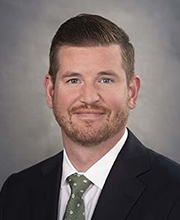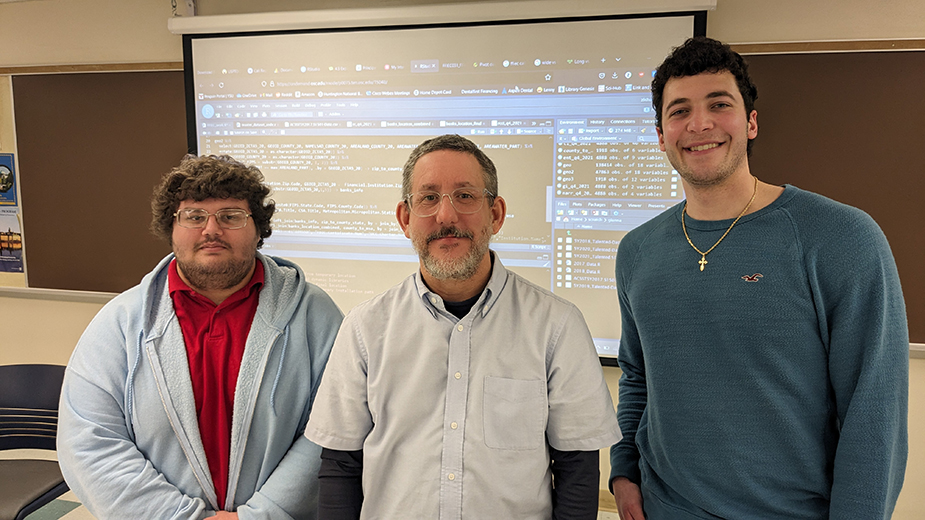YOUNGSTOWN, Ohio – It’s not your traditional college class.
Students come from different majors and range from first year to graduate. The professor doesn’t lecture and sometimes he doesn’t know the answer at first.
It’s the data mine, or special project in data analytics class, at Youngstown State University.
“It’s a term that has multiple meanings,” says G. Jay Kerns, a YSU mathematics and statistics professor who leads the class.
“When you talk to somebody and they say, ‘data mining,’ what they’re talking about is, in today’s world we have these huge data sets everywhere,” he says.
Any large retail business, for example, works with large data sets.
“Every time you go in a Walmart and you hear one of those [scanners] go, ‘beep,’ that’s a data point,” he says. “You can imagine, all of those beeps, all over the world, we’re talking billions of data points, every second.”
How It Works
Data is like a huge mountain. But mining it reveals structure, patterns and other meaningful information for retailers and consumers, Kerns explains.
“That’s what the word data mining means,” he says. “You’ve got this huge data set and you’re trying to understand it, but it’s too big. You’re trying to make sense out of it.”
In the class, which runs for two semesters, students work with companies that are trying to solve a problem using data.
“The data mine is the place where students from all walks of campus – it doesn’t matter what your major is, it doesn’t matter what your background is – can learn about data science, data visualization, predictive modeling… all of those different topics,” Kerns says.
The students work together and with the companies.
One team of students is working with Team NEO. The organization develops what’s called a vibrant economy index. YSU students are working with Team NEO on that index, looking for patterns, structure and actionable insights that northeastern Ohio companies can use to be successful, Kerns says.

Jacob W. Duritsky, Team NEO vice president of strategy, research and talent, is working with the YSU students as the company mentor on the project.
He says Team NEO handles a lot of data with the vibrant economy index comprised of 60 data points and 13 different markets.
“We’re looking for meaningful trends,” Duritsky says.
Team NEO has a long-standing partnership with YSU.
Whether the students he’s worked with in the data mine are freshmen or graduate students, they’ve been very professional, he says.
“I would say they are some of the brightest math and data minds I’ve come across in young people in the community,” Duritsky says.
He’s also impressed with their nontechnical skills. Not only do they understand the data, they’re able to explain it to those who may not share that aptitude but want to understand the core message.
“To be able to learn that additional element of it, the professionalism that goes along with it, I think it’s a good model of both technical skills and how to use them in the real world,” Duritsky says.
Another student team is working with DriveOhio, an initiative of the Ohio Department of Transportation that develops smart mobility technology. Students are analyzing trip data from automated vehicles.
Open to All
Kerns says, “It’s supposed to work for all majors. That’s our goal.”
A freshman may be seated next to a doctoral student. Math and computer science majors are joined by business, economics, psychology and physical therapy majors. That means left-brain and right-brain people work together. And it works.
An executive from one of the companies noted that’s what he’s looking for — different perspectives, Kerns says.
How It Started
The class is patterned after the Purdue University model.
“Purdue was the groundbreakers with this and we’re partnering with them,” Kerns says. “They’re showing us how to have a successful program. Their motto is ‘data science for all.’”
Purdue applied for a National Science Foundation grant to start its program with a supercomputer and built its data mine starting in 2018. It continues to grow.
In summer 2022, former YSU President Jim Tressel; Jennifer Oddo, vice president of the YSU Division of Workforce Education and Innovation; and state Sen. Michael Rulli visited Purdue and learned about that university data mine.
They brought the concept back to YSU.
The program also teaches soft skills such as teamwork, how to conduct a meeting, time management and organization.
“That’s again part of what’s amazing about this course…,” Kerns says. “They’re learning how to work with each other. They’re learning how to present their results to a nontechnical audience. That’s hugely important.”
YSU students met by teleconferencing with Purdue students, working in teams and with Purdue corporate partners.
The company provides the data, YSU provides the students. Companies also benefit by being exposed to young talent. That leads to internships for students.
Student Reaction
Nathaniel Willison, a senior math major from Slippery Rock, Pa., is taking the data mine class for the second time. He has a minor in data analytics and actuarial science.
“It was a great experience last year,” he says. “We got to work with a company, and it was real hands-on experience, almost like an internship. I really enjoyed it and applied those skills I learned at my internship over the summer as well as other classes.”
Willison is part of the team working on the Team NEO project.
“You’re working with a real company, with real data,” Willison says. “There’s no right answer. You come in here, you don’t know what’s going to happen next. You don’t know exactly what you’re looking for. You don’t know if there is a right answer to what you’re looking for. It’s like real life.”
That’s why he signed up to take the class a second time.
“You get to experiment,” Willison says. “You get to do things your own way. There’s no one way, set path on how to do it. You can be creative and also learn, fail, try again. I’ve learned a lot.”
Senior Zachary Shumaker of Austintown is taking the class for a second time, too. He’s majoring in economics with a minor in data analytics.
“The main reason why I took the data analytics class is because it’s different in the fact that it introduces you to teamwork,” he says.
“One of the challenges with a class like this is because it’s open to all majors, you’re going to have a wide variety of skills,” he says. “That’s the whole point. It’s a learning experience for everybody.”
Professor’s View
Just like the class is a marked departure for students, it’s a new way of doing things for the professor, too.
“In this class you come together with your peers from radically different backgrounds,” Kerns says. “We work together on a problem about data. It’s learning just in time. As the professor, I don’t have the answer ahead of time. I don’t know what the answer is. Nobody does. That’s why you’re here.”
YSU started the data mine in fall 2022 with 12 students. In fall 2023, 23 students enrolled.
“Our program doubled in one year,” Kerns says.
This fall, YSU will launch a data science and statistics master’s degree program.
“We’ve got great interest in the program,” Kerns says.
The growth capacity of the program is constrained by the number of partners. This semester, the program has three.
“Part of what we’re working on right now is expanding that list of partners,” Kerns says. “Those conversations are ongoing. We’re optimistic for the fall.”
Any partners that have data would benefit from the program.
“Anybody around here with data and a problem to work on, we’re interested,” Kerns says.
He says his involvement with the data mine has changed his world view.
“My degree is in mathematics,” he says. “When I went to school, I showed up to class. There was a professor there who talked for an hour and wrote on a chalkboard. I said nothing. I took notes. I went home and did my homework and came back to class the next day. This is not like that at all.”
With the data mine class, Kerns is there to keep students from going down a path that leads nowhere and from drawing conclusions not supported by the data.
“It’s a completely different way of education,” Kerns says.
There is no textbook. Students learn on the fly. It’s just-in-time learning.
After the pandemic, Kerns wondered how education would emerge.
“Now I see a way where we can learn, where the students can get value out of an educational experience in this rapidly changing climate,” he says. “I see a path forward now and it’s truly amazing. It has impacted every class that I teach and will forever forward.”
Pictured at top: Youngstown State University senior Zachary Shumaker, mathematics and statistics professor G. Jay Kerns and Nathaniel Willison, YSU senior, talk about the data mine class, for which Kerns is the professor.
